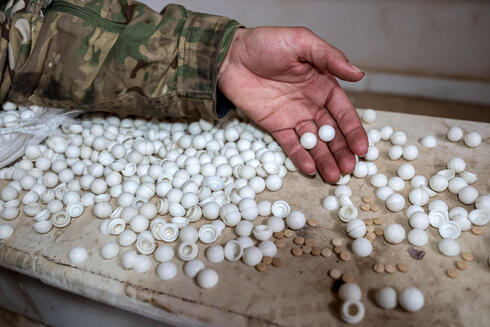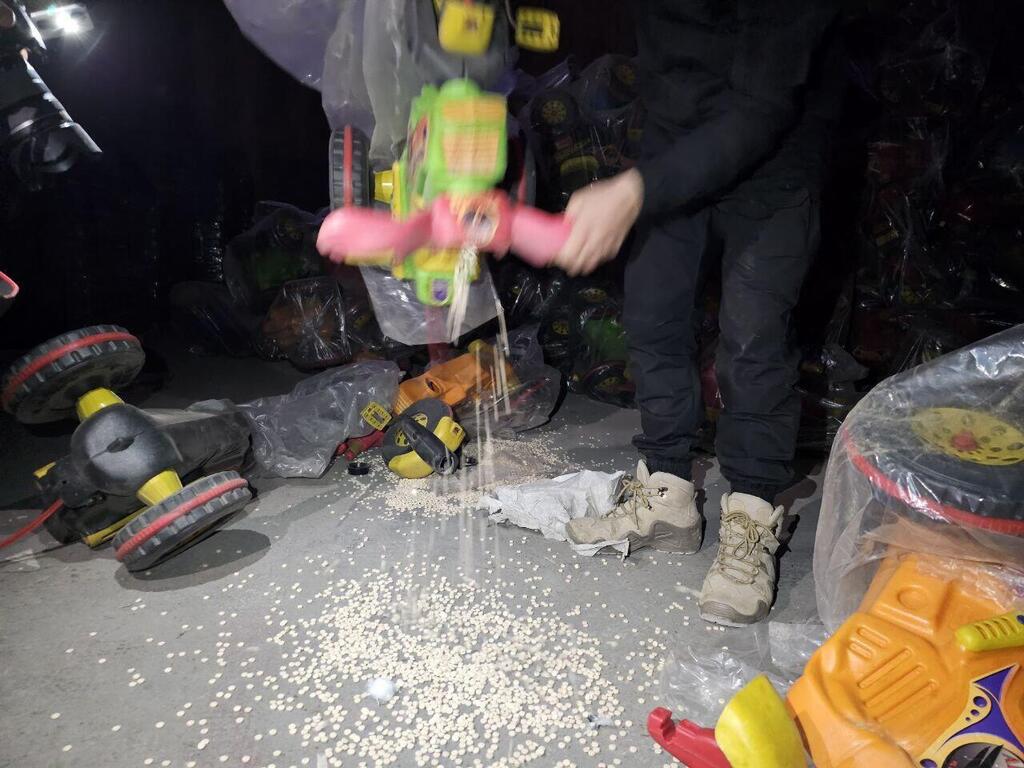While Damascus continues to publicize its anti-drug efforts, neighboring countries remain on high alert, frequently intercepting drug shipments at their borders with Syria. This underscores a harsh reality: the drug trade is no longer exclusive to the Assad regime. Even after the Syrian president’s fall and the waning influence of Hezbollah, the threat persists.
Last week, Syria’s Drug Enforcement Administration announced the discovery of a Captagon production facility in Homs, near the Lebanese border. Authorities confiscated equipment and raw materials. Coinciding with this, the Lebanese army raided a similar lab in the Hermel region, also near the Syrian border.
4 View gallery
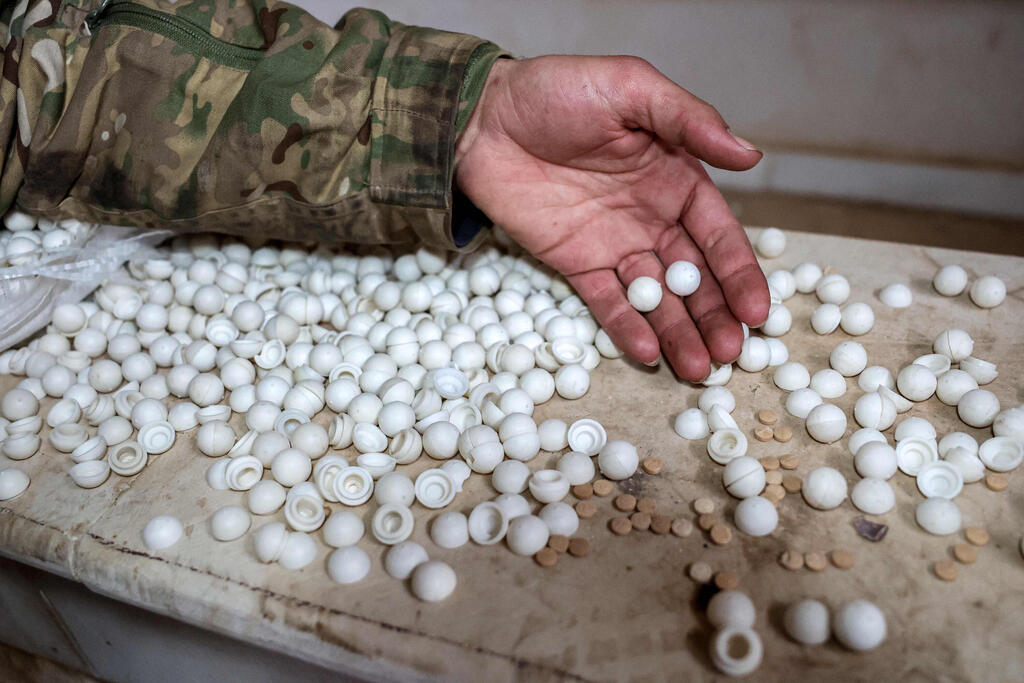

A Syrian rebel fighter examines Captagon pills produced in an improvised lab inside a farm villa in the town of al-Dimas, about 17 miles northwest of Damascus, on December 22, 2024
(Photo: OMAR HAJ KADOUR / AFP)
These seizures appear to be mere drops in the ocean. Captagon production continues unabated, and shipments regularly make their way toward Jordanian and Gulf borders. The real architects of these networks—those who manage and protect them—remain untouched.
Since the outbreak of the Syrian war, the country has descended into a state of organized chaos. The Assad regime found in narcotics an alternative economy to compensate for the collapse of state institutions and revenue streams.
Captagon, a small stimulant pill, has become a multi-billion-dollar export commodity, smuggled through intricate routes into the Gulf and Europe.
4 View gallery
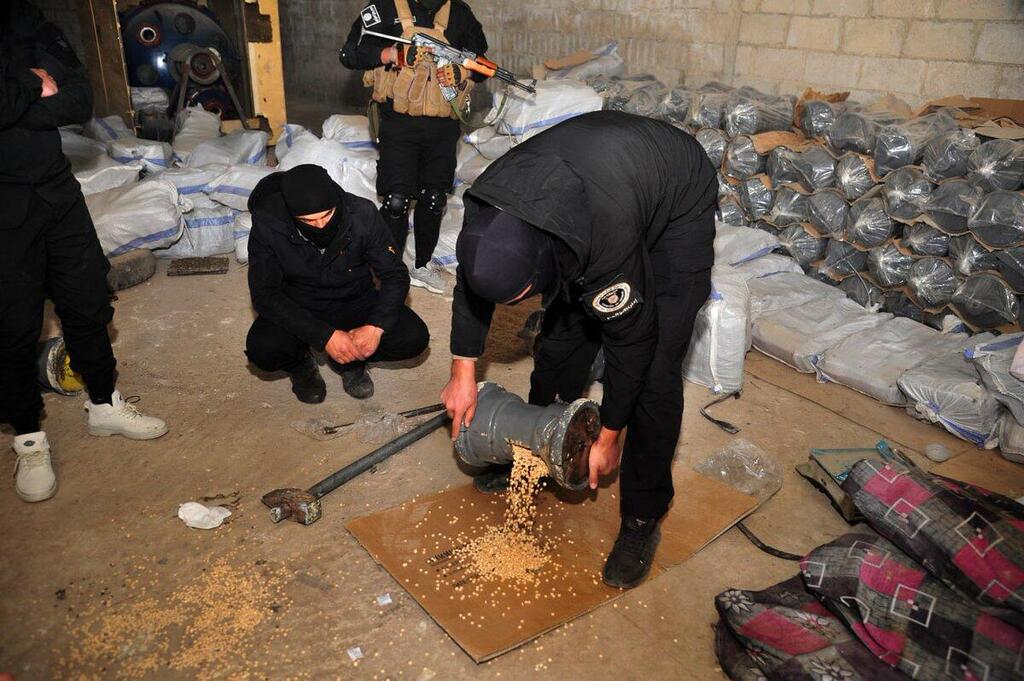

A warehouse containing Captagon drugs discovered in the Saboura area along the Damascus–Beirut highway
(Photo: via X)
Within this arrangement, Captagon transcended mere illicit trade. It became an instrument of governance, funding, and regional leverage—a tool of political manipulation and battlefield financing.
While Syria remains largely passive, the Hashemite Kingdom of Jordan has taken the lead in confronting the crisis. Over the past two years, Amman has bolstered military and intelligence operations along its northern frontier. Smuggling attempts from Syrian territory now occur on an almost daily basis and are increasingly accompanied by armed incursions.
In the latest such event, Jordanian Armed Forces foiled a major smuggling attempt last Sunday. According to an official military statement, border surveillance detected a group of traffickers attempting to cross illegally from Syria. A rapid reaction force was deployed, engaging per standard rules of engagement. The traffickers fled back into Syrian territory, leaving behind large quantities of Captagon, which were seized.
A senior Jordanian military source said: “Smugglers now operate with advanced tactical methods—using drones, encrypted communications, and jamming devices. This suggests the involvement of actors with high-level operational and intelligence capabilities.”
Despite growing speculation about Assad’s fall and Hezbollah’s diminishing role, security experts caution that the Captagon threat is likely to endure. Over the last decade, a complex infrastructure has emerged—financial, logistical, and security-oriented—that could survive the political downfall of its founding figures.
Retired Brigadier General Mustafa al-Sheikh said: “Captagon is no longer a project run by individuals—it is an integrated system involving military officers, smugglers, militia leaders, and transnational money laundering networks. The fall of Assad or Nasrallah won’t automatically dismantle it. On the contrary, it may become even more dangerous in the absence of centralized authority.”
He added: “The real danger is that parts of Syria—especially the south and west—may become ungoverned zones where local warlords control drug operations in the absence of a structured political transition.”
Despite numerous reports showing the Captagon trade yields billions annually, the international community has yet to develop a coherent strategy to address it. Sanctions from the US and Europe have targeted individuals and entities, but with little systemic effect.
4 View gallery
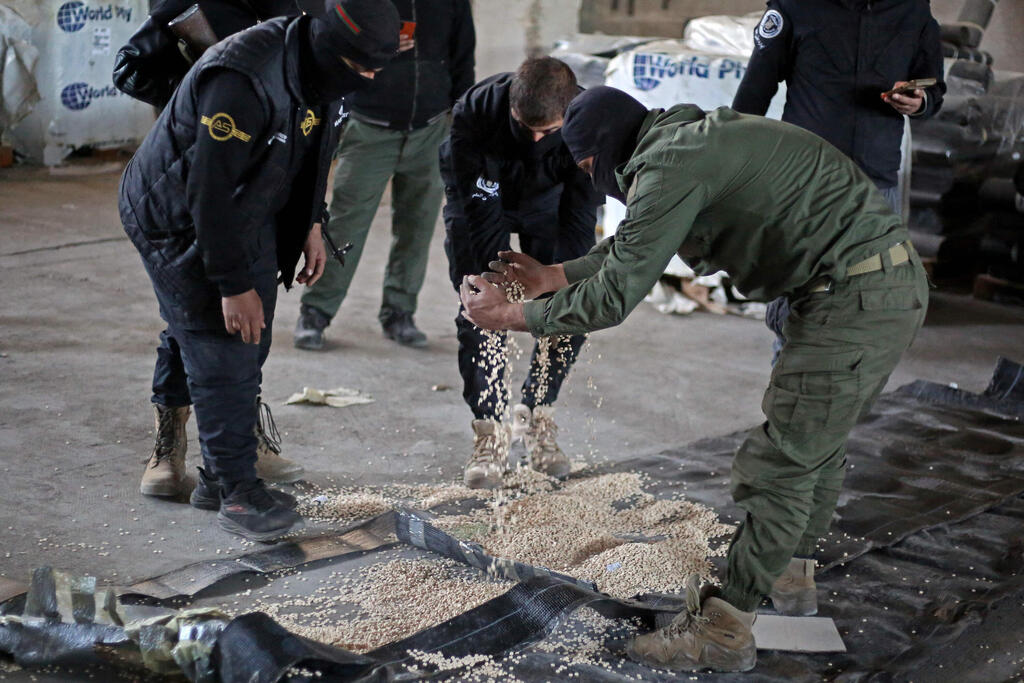

Security forces of Syria’s new government inspect a warehouse where Captagon pills were previously hidden inside children’s toys, hookahs, household doors and plastic insulation, during a raid in the city of Latakia on January 19, 2025
(Photo: AAREF WATAD / AFP)
Security analyst Abdul Latif Mustafa said: “Major powers see ‘stability’ in Syria—even under Assad—as preferable to chaos. With Washington and Brussels consumed by crises in Ukraine and Gaza, there’s little bandwidth for Syria’s narcotics threat.”
He emphasized the urgency of creating a regional-international alliance, similar to counter-terrorism coalitions, to combat the drug trade. “Captagon now fuels extremism and threatens the internal stability of several countries,” he said.
According to Abdul Latif Mustafa, the first step in dismantling this organized criminal empire is cutting off its funding sources. That would require: Targeting drug production facilities and infrastructure in Syria and Lebanon; cracking down on money laundering networks tied to Captagon revenues; a trilateral security coordination mechanism between Jordan, Lebanon and Iraq to be established with international support; enhancing aerial and ground surveillance systems along Syrian borders; and imposing stringent sanctions on both state and non-state actors involved in narcotics, regardless of official or militia status.
The Captagon crisis is not just a matter of narcotics—it is a hybrid threat, intertwining organized crime, economic desperation, and regional power struggles. As long as shipments continue to flow and political will remains lacking in Damascus and its allies, Captagon will remain both a “tool of governance” and a “weapon of coercion” in the hands of a resilient regional axis.
The response cannot be local alone. It must be regional and international, equipped with tools proportional to the scale of the threat. Security is no longer just about borders—it’s about political will. And so far, that will remain absent.
